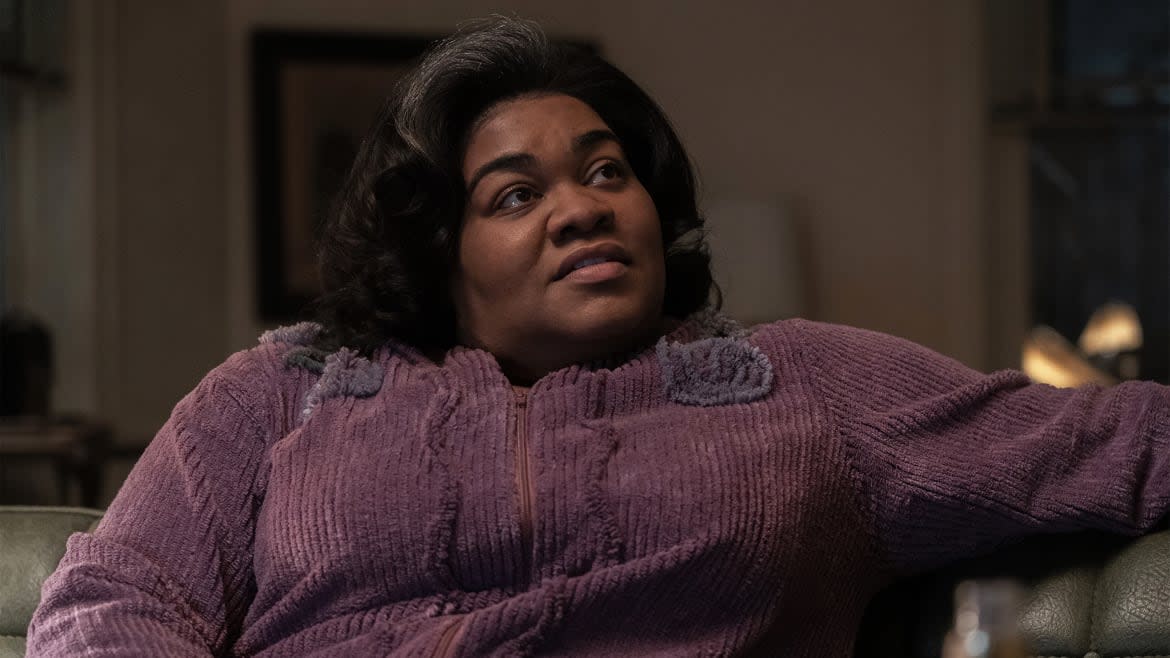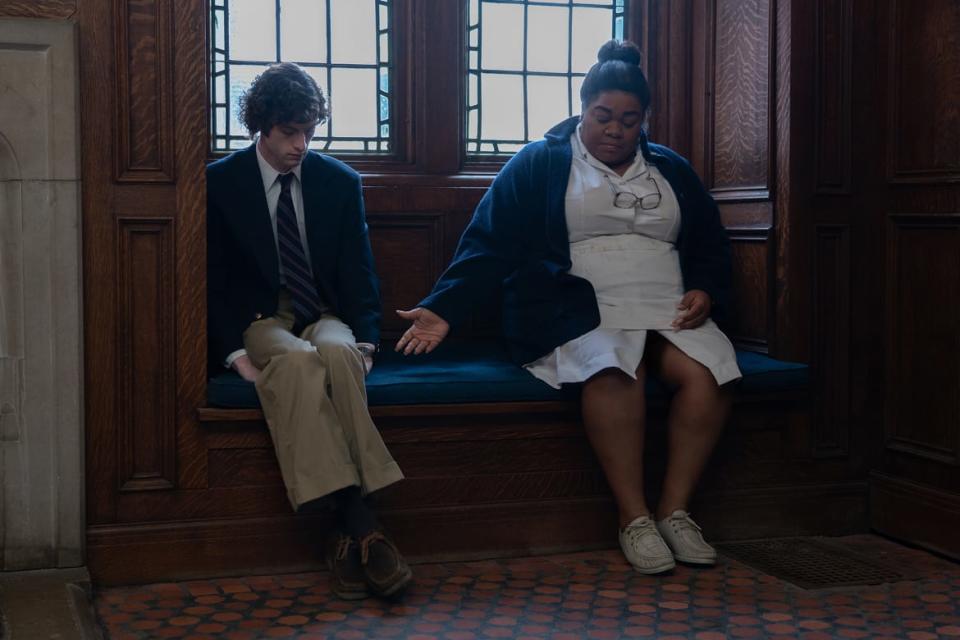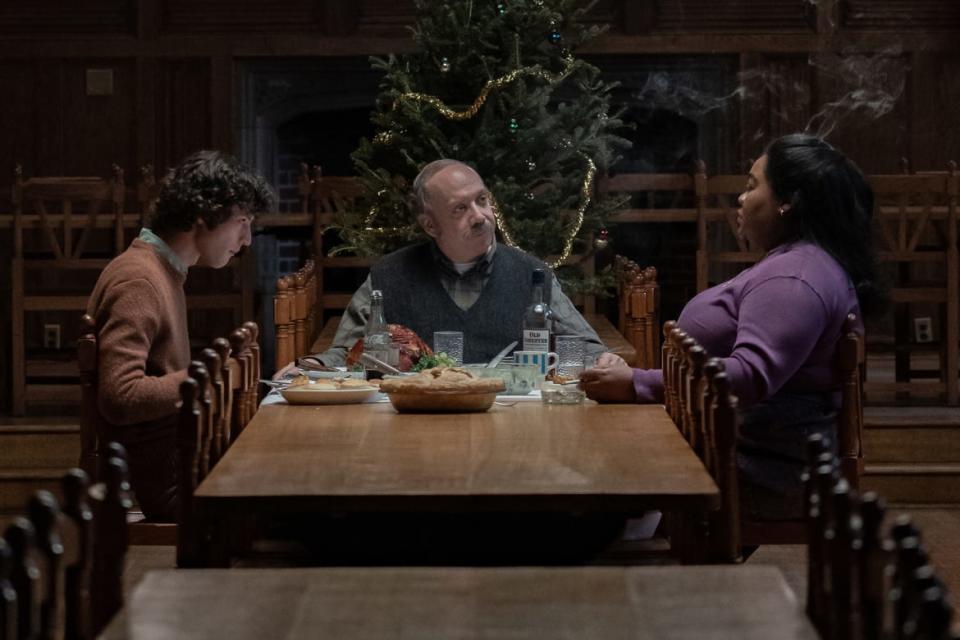‘The Holdovers’ Will Win Da’Vine Joy Randolph an Oscar

Beautifully performed, extremely funny, and deeply emotional, Alexander Payne’s 1970s-set holiday-season dramedy The Holdovers (Oct. 27) seems destined for awards success. While Payne’s direction is strong and screenplay stellar, the film’s most worthy win would be for its supporting actress, Da’Vine Joy Randolph. Randolph delivers a quiet, precise, and perfect performance that elevates her already impressive body of work to new exceptional highs.
The Holdovers takes place at Barton Academy, a prestigious New England boarding school. It’s there we find Paul Hunham (Paul Giamatti), a curmudgeonly teacher of ancient history who’s just discovered he’s responsible for the “holdovers,” a group of students who won’t be returning home for Christmas. The only other adult remaining on campus for the two-week period is Mary Lamb (Randolph), the head cook at the school. She’s staying behind to make sure the kids have food—although, as she reminds Paul, they’ll have to rely on whatever ingredients are already on campus. But Mary, like Paul, wasn’t planning on leaving Barton anyway, for heartbreaking reasons.
It’s not long after the film first introduces Mary that we find out why that is. Mary doesn’t enjoy having the spotlight put on her, but that’s exactly what happens at the school’s last church service before the Christmas break. We learn that Mary’s son Marcus was just killed in the Vietnam War, just one year after graduating from Barton Academy—which the priest uses to remind everyone of how grateful they should be for their own lives and families. As if the attention placed on her wasn’t frustrating enough, that remark seems to particularly affect Mary, who sits quietly, clearly wishing she were anywhere but here.
‘The Holdovers’ Is Alexander Payne’s Best Movie in More Than a Decade
Like much of the staff and faculty, Mary lives on the Barton campus, where her grief weighs heavily on her. It’s where she spent much of her time with her son—and it’s also the last place they were together. But working in the kitchen still has its benefits; it allows her to quietly observe these spoiled Barton boys, making her an ally to Paul. When Paul complains that the kids he has to both teach and take care of are all rich and dumb, she doesn’t disagree. “Rich and dumb—popular combination here,” she slyly remarks. Randolph excels at revealing Mary’s deeper well of emotion and humor in these moments, thanks to her magnetic screen presence; she’s impossible to look away from even when she’s just making a cutting quip.
Randolph masks Mary’s sadness with wit, which makes it easier than handling the pain head-on. But during a monologue in which she tells Paul why she doesn’t want to spend Christmas with her family, the actress removes the facade without losing her warmth and humor. As Mary talks about how she couldn’t afford for Curtis to go to university, and that she started working at the school to give her son a good education—she’s worked there for 25 years, and everything she does has been for her child, while Curtis joined the army to ease the financial burden on his mother—we feel her heartbreak. But Randolph switches seamlessly between devastation and humor, a talent captured best when she shifts gears again to mention that her son hated Paul and that he’s a real asshole (which Paul doesn’t hesitate to agree with).

Dominic Sessa and Da’Vine Joy Randolph.
Da’Vine Joy Randolph is known for her comedic talents, which she perfectly embeds into this more dramatic, emotional role. Once Christmas comes, Angus Tully (Dominic Sessa) is the only one of the “holdover” students left, leaving just him, Paul, and Mary at the school. Another faculty member is having a Christmas party at her home, and Angus desperately wants to go—but Paul is unsure, as he’s anxious about making an appearance himself. Mary’s cutting approach strikes again here, telling Paul, “If you’re too chickenshit to attend the party, then say so, but don’t fuck it up for the little fucking asshole!” It’s a perfect line reading, made infinitely funnier by the fact that, literally seconds before, she told Angus to watch his language after daring to exclaim “Jesus Christ” on Christmas.
With this emotional depth and range, Mary is not an easy role to play. It’s also not a showy one—bar one moment at the Christmas party, she never even raises her voice. And even though Mary’s recent tragedy inspires sympathy, that the character herself prefers isolation makes her initially hard to read—at least until Paul and Angus came into her life. Randolph’s performance is subtle, earnest work, imbuing Mary with an inspiring, infectious amount of love.
‘The Persian Version’ Will Make You Want to Call Your Mom
Toward the end of the film, Mary is finally ready to leave Barton for a few days and spend time with her sister’s family. When she sees her sister for the first time in ages, Randolph’s face is beaming with joy; it’s the happiest we’ve ever seen her. Once inside, we see Mary unpacking her bags, including a small box. She makes her way to the drawers in the nursery for her sister’s upcoming baby, takes out Curtis’ own baby clothes from the box, and lovingly, carefully places them into the drawers.

Dominic Sessa, Paul Giamatti, and Da’Vine Joy Randolph.
It’s such a special moment for her, for us, and for Randolph. We’ve spent so much time watching Mary break down her walls and the walls of the men around her, and this feels like enormous progress for her character. It’s a deeply intimate, carefully observed, and exquisitely performed scene whose success stems largely because of the actor’s work. It’s a moment of movie magic conjured by Da’Vine Joy Randolph. In this gorgeous movie with three phenomenal performances, it’s Randolph’s work that shines brightest. It deserves as much notice as possible—even if Mary herself would hate that.
Get the Daily Beast's biggest scoops and scandals delivered right to your inbox. Sign up now.
Stay informed and gain unlimited access to the Daily Beast's unmatched reporting. Subscribe now.
